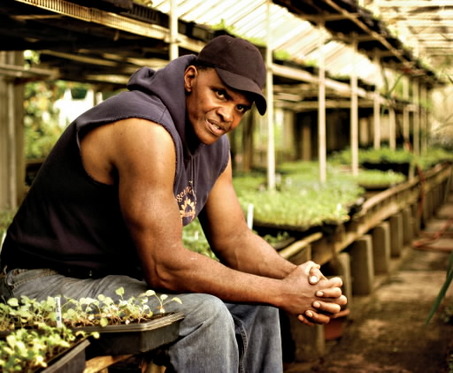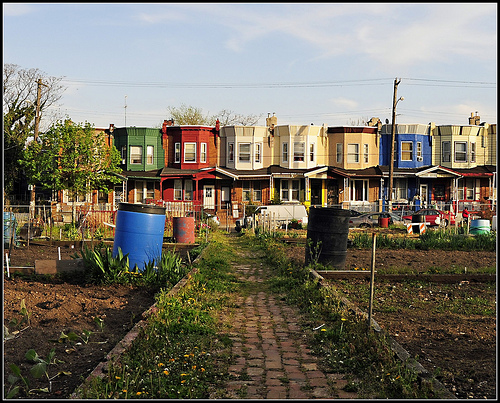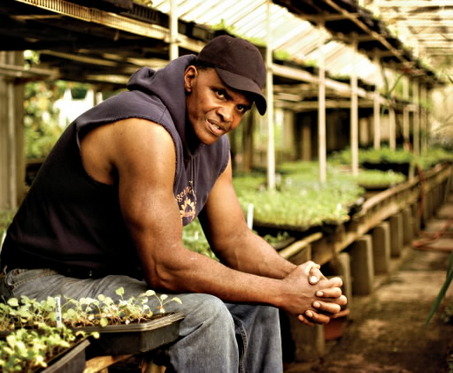 Will Allen: Growing power–and gaining influence in development circles, too. At the Clinton Global Initiative wrap-up on Friday, ex-President Clinton made waves in the sustainable-ag world by declaring Will Allen of Milwaukee/Chicago-based based Growing Power his “hero.”
Will Allen: Growing power–and gaining influence in development circles, too. At the Clinton Global Initiative wrap-up on Friday, ex-President Clinton made waves in the sustainable-ag world by declaring Will Allen of Milwaukee/Chicago-based based Growing Power his “hero.”
The real news was buried in the press release, though. Toward the bottom of a listing of verbal “commitments” from NGOs and foundations, we find this:
Growing Power commits to strengthen food security for school children and their care givers in South Africa and Zimbabwe. Growing Power will build a new model of local food systems to ensure adequate nutrition in the short-term and build a long-term foundation for competitive African human capital in the global market place.
So Growing Power will be bringing its community-based, low-input style of agriculture to Africa–under the aegis of a group most known for its top-down, Big Solution way of development work.
I got Erika Allen, daughter of Growing Power founder Will and leader of the group’s Chicago operations, on the phone Monday to talk about the announcement.
She told me that in the current phase, Growing Power is hoping to raise $2 million to get its Africa initiative started. (The Clinton Global Initiative doesn’t so much fund specific projects as match funders with projects.)
Allen described the proposed initiative as a “cultural exchange”–Growing Power reps would be learning about how food production currently works in South Africa and Zimbabwe; looking closely at local assets, resources, gaps, and needs. And food-system actors from those places would visit Growing Power sites in the United States–not just at the flagship enterprises in Milwaukee and Chicago, but also at partner projects in Arkansas, Georgia, Kentucky, Massachusetts, and Mississippi.
From there, Growing Power and its partners in southern Africa would work on “modifying our production systems to local resources there.”
She stressed that what works in Milwaukee won’t necessarily fly in Zimbabwe. Here in the United States, Growing Power essentially siphons off some of the enormous food waste generated by a modern U.S. city and transforms it into fertile soil, which is then used to grow food. But African cities generate less compostable waste.
 Erika Allen of Growing Power. “The challenge will be to find the systems that work in areas with less excess,” Allen told me. She cited Growing Power’s aquaculture setup, where waste from tilapia tanks is used to fertilize watercress, one example of a low-input system that could work in Africa.
Erika Allen of Growing Power. “The challenge will be to find the systems that work in areas with less excess,” Allen told me. She cited Growing Power’s aquaculture setup, where waste from tilapia tanks is used to fertilize watercress, one example of a low-input system that could work in Africa.
“Overall, it’s about helping people use their resources to build soil and grow food,” she said.
In a single sentence, Allen had articulated a vision completely counter to the top-down model of development that has dominated U.S. policy since at least the Cold War–the agricultural model most famously promoted by the recently deceased Nobel laureate Norman Borlaug. In this model, imported agrichemicals and seed varieties provide the path to food security in the global south. And trade is venerated with an almost religious zeal–nations should only produce food insofar as they have a “comparative advantage” in a particular crop. “High-value” crops like fresh produce should be exported to the industrialized north, where consumers can pay top dollar for them; “low-value” staple crops should be imported when expedient.
Make no mistake–even though more than a billion people globally lack sufficient access to food and farmers in the global south operate in a state of permanent crisis, that model still dominates today. The “Millennium Villages” concept for Africa championed by Harvard’s Jeffrey Sachs hinges on “new advances in science and technology.” To help boost food security, these showcase villages receive subsidies for imported fertilizers and seeds.
And the Gates Foundation, which has been organizing a massive attempt to transform food production in Africa, has made a game attempt to be open to new models of ag development. But as Annie Stattuck, Raj Patel, and Eric Holt-Gimenez show in an excellent recent article in The Nation, the overall thrust has been in the direction of high-tech “solutions” to the continent’s food problems.
Meanwhile, the Obama administration has recently taken a deep bow to the conventional ag-development gods, by putting agrichemical-industry stalwarts in charge of both agriculture negotiations at global trade talks and USDA-funded research. Analyzing the latter appointment, that of the Monsanto-affiliated Roger Beachy to lead the USDA’s new National Institute of Food and Agriculture, Science blog recently wrote that:
Beachy’s interests in biotechnology and the developing world closely match those of his new boss, USDA’s Under Secretary for Research Rajiv Shah. They also fit with President Barack Obama’s desire to increase agricultural assistance to developing countries.
The Growing Power initiative points to a new direction. In place of costly and often ecologically and socially ruinous high-tech methods, the Allens present a vision of appropriate technology: techniques that communities can own and manage themselves, without the perpetual need to commit precious resources to toxic agrichemicals and patent-protected seeds.
As debate rages about how to “feed the world” amid population growth, climate change, and fossil-fuel depletion, projects like this one are critical. I’ll be watching it closely.



